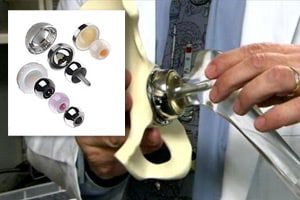
A new study reveals that nearly eight percent of hip implant devices used in hip replacement surgery have no readily available evidence of safety or effectiveness. The study, published online last month in the British Medical Journal (BMJ), indicates that the current regulatory process “seems to be entirely inadequate.” The authors call for a revised […]
 A new study reveals that nearly eight percent of hip implant devices used in hip replacement surgery have no readily available evidence of safety or effectiveness.
A new study reveals that nearly eight percent of hip implant devices used in hip replacement surgery have no readily available evidence of safety or effectiveness.
The study, published online last month in the British Medical Journal (BMJ), indicates that the current regulatory process “seems to be entirely inadequate.” The authors call for a revised system for introducing new orthopedic devices, bmj.com reports.
Metal-on-metal hip replacement devices are associated with a high failure rate, and this highlights the need for a better evidence base for orthopedic implants, according to a news release on bmj.com. Researchers at the University of Oxford undertook their study to determine whether hip replacement joints currently in use have readily available evidence of clinical effectiveness to support their use. Using data from the National Joint Registry (NJR) of England and Wales, the researchers identified implants used in hip replacement surgery in 2011 that were rated “unclassified” or “pre-entry” by the Orthopaedic Data Evaluation Panel (ODEP), the body that rates implants according to levels of evidence.
Implants termed “unclassified” have no evidence submitted by the manufacturers, while “pre-entry” products have less than three years of evidence. The review showed that 10,402 (7.6%) of the 136,593 components used in primary hip replacements in 2011 were implanted without readily identifiable evidence of clinical effectiveness. The authors expressed concern over this, “particularly in light of the widespread publicity surrounding recent safety problems with regard to some resurfacing and other large diameter metal-on-metal joint replacements.” A number of metal-on-metal implants, including those manufactured by Johnson & Johnson’s DePuy Orthopaedics unit, have been recalled because of injuries and complications associated with the devices, including metallosis, infection, inflammation, severe pain, tissue damage, bone loss, and lack of mobility, according to Bloomberg News. Thousands of lawsuits have been filed against device manufacturers and DePuy recently announced a proposed multibillion-dollar settlement for those who have undergone revision surgery to remove and replace the hip devices.
According to bmj.com, the authors of the study suspect that the lack of good quality evidence may be related to the rapid proliferation of devices in the past two decades, as demand for hip replacement surgery rapidly increased worldwide. And, the authors say, it is difficult to conduct high quality randomized controlled trials with orthopedic implants. They conclude that “the need still exists for an improved and more rigorous approach to regulation of devices to avoid devices with no available evidence being used in a widespread and uncontrolled manner.”


